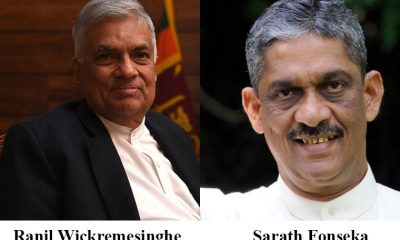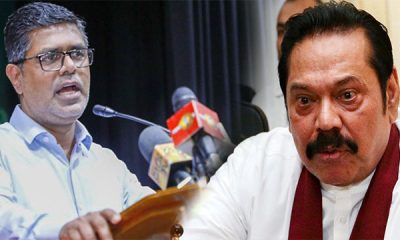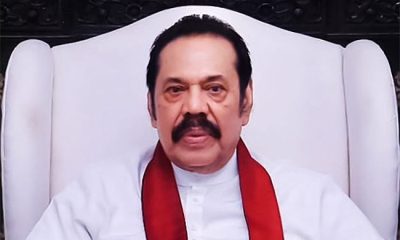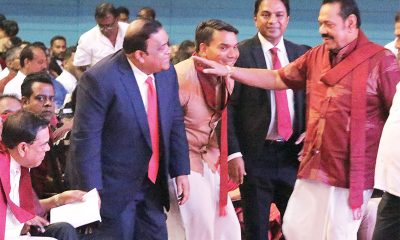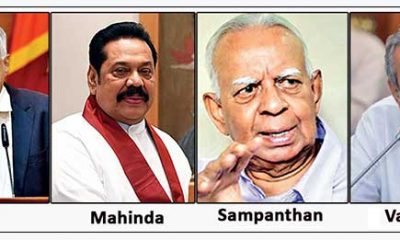News
MR blames economic crisis on Yahapalana leaders
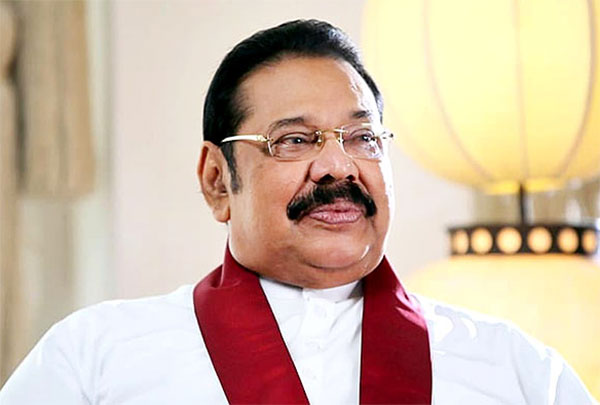
SLPP leader Mahinda Rajapaksa yesterday (28) hit back at critics, claiming that a robust economy had been built under his presidency. He said the UNP-SLFP government which ruled the country during the 2015-2019 period should be held responsible for the current economic crisis.
The following is the text of a statement, titled ‘the origins of Sri Lanka’s economic crisis’ issued by former President Rajapaksa: “A heated discussion is now taking place about those responsible for the present economic crisis. The Central Bank reports will show that during my nine years as President, economic growth averaged 6% a year during the four war years, from 2006 to 2009, and it increased to 6.8% in the five post-war years, from 2010 to 2014. Hence Sri Lanka’s per capita GDP increased threefold from USD 1,242, at the end of 2005, to USD 3,819 by the end of 2014. The contribution that my government made to Sri Lanka’s per capita GDP was well over twice that of all other post-independence governments, from 1948 to 2005, put together. Though the per capita GDP came down to USD 3,474 in 2022 as the pandemic caused the economy to contract, that statement remains valid to this day.
The debt to GDP ratio was a very healthy 69% at the end of 2014 having being brought down from 90% at the end of 2005. The All Share Price Index rose from 1,922, at the end of 2005, to 7,299 by the end of 2014. This economic boom was achieved despite the war, the global food crisis of 2007, the global financial crisis of 2008-2009 and the highest crude oil prices in world history. Crude oil cost an average of USD 74 per barrel throughout the entire period from 2006 to 2009 and an average of USD 103 from 2010 to 2014. The IMF Country Report No. 14/285 of September 2014 stated firstly that Sri Lanka’s “Macroeconomic performance has generally exceeded expectations”. Secondly that “Sri Lanka has made notable advances in recent years, and appears to be on its way to joining the ranks of upper middle income countries”. Thirdly that “Sri Lanka’s economic growth has been among the fastest in Asia’s frontier and developing economies in recent years”.
Hence the fact that I left behind a very robust economy in January 2015 is well documented. After I was voted out, the economic growth rate dropped to 4.2% in 2015 and ended up in the negative range at 0.2% below zero by 2019. Sri Lanka’s total outstanding external debt had increased by nearly 28% from USD 42,914 million at the end of 2014, to USD 54,811 million by the end of 2019. The debt to GDP ratio which had been brought down to 69% by the end of 2014, had increased to nearly 82% by the end of 2019. The All Share Price Index declined from 7,299 at the end of 2014 to 5,990 by the end of October 2019. Yet during the entire five-year period from 2015 to 2019 the average price of crude oil was USD 60 per barrel – the lowest in recent history.
There were no external reasons for Sri Lanka’s economic decline between 2015 and 2019. India and Bangladesh experienced average growth rates in excess of 7% and the Maldives over 6% during this period. Even developed countries like the USA and Germany experienced robust economic performance during those years. However, Sri Lanka’s average growth rate between 2015 and 2019 was just 3.5%, equal to the growth rate recorded in 2021 at the height of the pandemic. The accumulation of foreign commercial debt between 2015 and 2019 particularly in the form of International Sovereign Bonds (ISBs) was by far the worst disaster to befall us during that period.
When I was defeated in January 2015, outstanding ISBs amounted to USD 5,000 million and it was amply covered by our foreign reserves of USD 8,208 million. However, between 2015 and 2019 outstanding ISBs increased threefold to USD 15,050 with borrowings of USD 2,150 million in 2015, USD 1,500 million in 2016, USD 1,500 million in 2017, 2,500 million USD in 2018 and USD 4,400 million in 2019. Of this, USD 2,000 million was used to rollover ISB’s taken during my tenure, thus the total amount in new ISB’s issued between 2015 and 2019 is USD 10,050 million. Despite the build-up of the stock of outstanding ISBs to USD 15,050, Sri Lanka’s total foreign reserves was just USD 7,642 million at the end of 2019.
Thus, when I became Prime Minister again in November 2019, our government inherited an economy that was already on its last legs. It was in this weak and vulnerable situation that the Covid-19 pandemic hit Sri Lanka in early 2020 – the consequences of which needs further discussion. In any discussion of the economy, it is vital to note that the per capita GDP is the most fundamental economic indicator used to judge the economic situation of a country and the contribution of my 2006-2014 government to increasing Sri Lanka’s per capita GDP is more than double that of all other post- independence governments put together. The people of this country should base their decisions on proper data and facts and not on noise, lies and propaganda. Sri Lanka cannot afford another political mistake like that of January 2015. “
News
US sports envoys to Lanka to champion youth development

The U.S. Embassy in Colombo welcomed the U.S. Sports Envoys to Sri Lanka, former National Basketball Association (NBA) and Women’s National Basketball Association (WNBA) players Stephen Howard and Astou Ndiaye, from June 8 through 14.
The Public Diplomacy section of the U.S. Embassy said that it would launch a weeklong basketball program intended to harness the unifying power of sports, made possible through collaboration with Foundation of Goodness and IImpact Hoop Lab.
While in Sri Lanka, Howard and Ndiaye, both retired professional basketball players, will conduct a weeklong program, Hoops for Hope: Bridging Borders through Basketball. The Sports Envoys will lead basketball clinics and exhibition matches and engage in leadership sessions in Colombo and Southern Province for youth aged 14-18 from Northern, Uva, Eastern and Western Provinces, offering skills and leadership training both on and off the court. The U.S. Envoys will also share their expertise with the Sri Lanka Basketball Federation, national coaches, and players, furthering the development of basketball in the country. Beyond the clinics, they will collaborate with Sri Lankan schoolchildren to take part in a community service project in the Colombo area.
“We are so proud to welcome Stephen and Astou as our Sports Envoys to Sri Lanka, to build on the strong people-to-people connections between the United States and Sri Lanka,” said U.S. Ambassador Julie Chung. “The lessons that will be shared by our Sports Envoys – communication, teamwork, resilience, inclusion, and conflict resolution – are essential for leadership development, community building, equality, and peace. The U.S. Sports Envoy program is a testament to our belief that sports can be a powerful tool in promoting peace and unity.”
News
Rahuman questions sudden cancellation of leave of CEB employees

SJB Colombo District MP Mujibur Rahuman in parliament demanded to know from the government the reasons for CEB suspending the leave of all its employees until further notice from Thursday.
MP Rahuman said that the CEB has got an acting General Manager anew and the latter yesterday morning issued a circular suspending leave of all CEB employees with immediate effect until further notice.
“We demand that Minister Kanchana Wijesekera should explain this to the House. This circular was issued while this debate on the new Electricity Amendment Bill was pending. There are many who oppose this Bill. The Minister must tell parliament the reason for the urge to cancel the leave of CEB employees,” the MP said.However, Speaker Mahinda Yapa Abeywardena prevented Minister Wijesekera responding to the query and said that the matter raised by MP Rahuman was not relevant.
News
CIPM successfully concludes 8th Annual Symposium

The Chartered Institute of Personnel Management (CIPM) successfully concluded the 8th Annual CIPM Symposium, which took place on 31st May 2024. Themed “Nurturing the Human Element—Redefining HRM in a Rapidly Changing World,” the symposium underscored the pivotal role of human resource management (HRM) in today’s dynamic global landscape. Since its inception in 1959, CIPM has been dedicated to advancing the HR profession through education, professional development, and advocacy, solidifying its position as Sri Lanka’s leading professional body for HRM.
Ken Vijayakumar, the President of the CIPM, graced the occasion as the chief guest. The symposium commenced with the welcome address by the Chairperson, Prof. Arosha Adikaram, followed by the Web Launch of the Symposium Proceedings and Abstract Book by the CIPM President. The event featured distinguished addresses, including a speech by Chief Guest Ken Vijayakumar, President of CIPM, and an address by Guest of Honor Shakthi Ranatunga, Chief Operating Officer of MAS Holdings Pvt. Ltd., Sri Lanka.
The symposium also featured an inspiring keynote address by Prof. Mario Fernando, Professor of Management and Director of the Centre for Cross Cultural Management (CCCM) at the University of Wollongong, Australia.
Vote of Thanks of the inauguration session was delivered by Dr. Dillanjani Weeratunga, Symposium Co-chair.
The symposium served as a comprehensive platform for researchers to present their findings across a wide range of critical topics in HRM. These included Cultural Diversity and Inclusion, Talent Development and Retention, Ethical Leadership and Corporate Social Responsibility, Adapting to Technological Advancements, Mental Health and Well-being at Work, Global Workforce Challenges, Employee Empowerment, and Reskilling and Upskilling.
The plenary session was led by Prof. Wasantha Rajapakse. Certificates were awarded to the best paper presenters during the valedictory session, followed by a vote of thanks delivered by Kamani Perera, Manager of Research and Development.
The annual symposium of CIPM was a truly inclusive event, attracting a diverse audience that spanned undergraduates, graduates, working professionals, research scholars and lecturers. This widespread interest highlights the symposium’s significance in the field of HRM, offering a unique opportunity for everyone to network and learn from scholarly brains.The CIPM International Research Symposium was sponsored by Hambantota International Port, Sri Lanka Institute of Information Technology (SLIIT), E B Creasy & Co. PLC, and Print Xcel Company.




